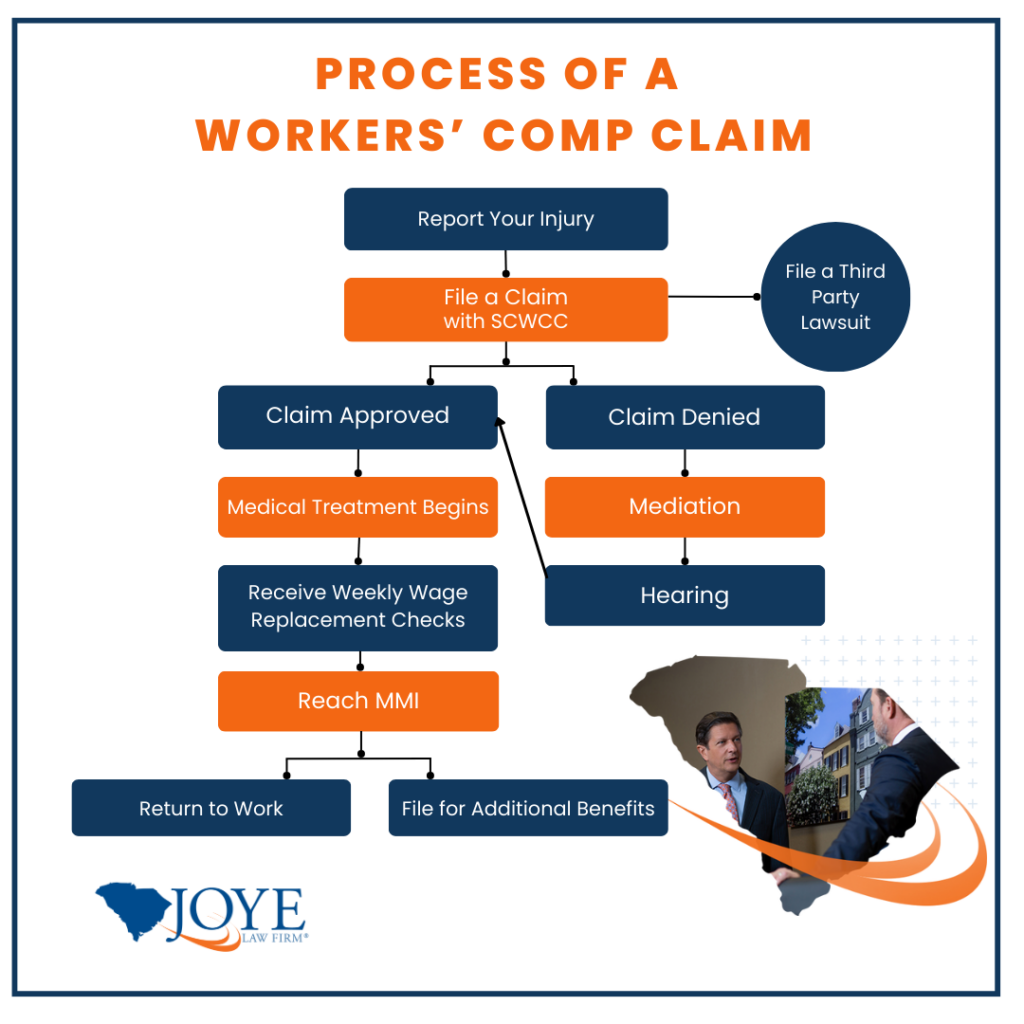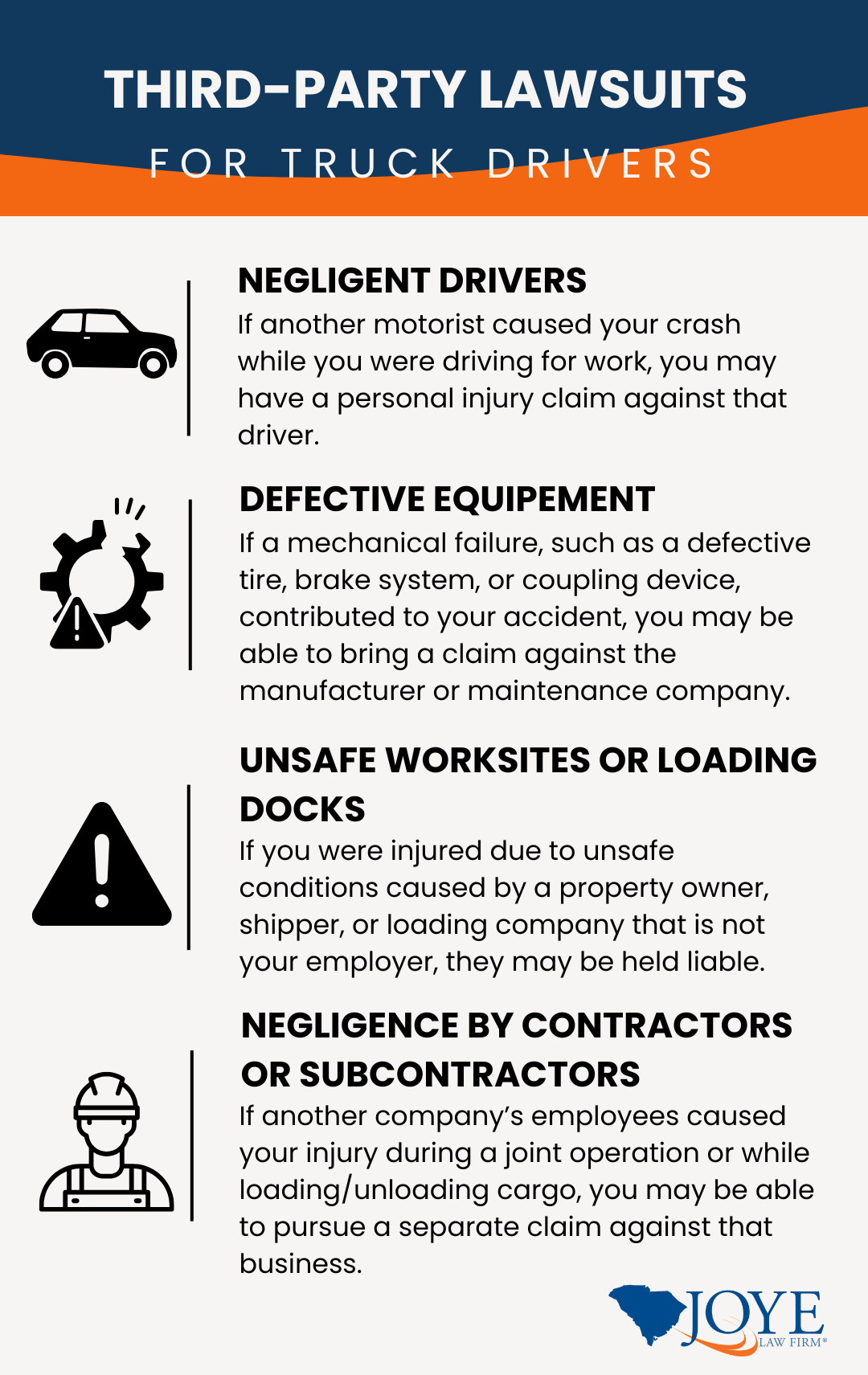
In many cases, commercial truck drivers injured on the job in South Carolina are entitled to workers’ compensation benefits. However, the path to getting that compensation can be complicated. Unlike many other types of workers, a trucker’s job often involves crossing state lines, working long hours, and sometimes being classified in a way that makes their employment status unclear. These factors can create significant obstacles when trying to file a workers’ compensation claim. For many injured truckers, navigating the system and understanding their rights is the first big challenge.
In South Carolina, workers’ compensation laws are designed to provide benefits to injured workers regardless of who was at fault for the workplace injury. However, for truck drivers, especially those considered independent contractors or owner-operators, the question of whether they are eligible for these workers’ compensation benefits is often the most pressing issue.
At Joye Law Firm Injury Lawyers, we address the different challenges that injured truckers face. We have helped countless individuals in similar situations, including a workers’ compensation case where we secured a $299,771.43 award for a truck driver who injured his neck and back while lifting a track onto a military vehicle. Our award-winning lawyers are leaders in the field, with many holding leadership positions in respected organizations like South Carolina Association for Justice, Brain Injury Association, and Injured Workers’ Advocates. We know what you’re up against and are here to help guide you through the workers’ compensation claims process in South Carolina.
Are Truck Drivers Covered by Workers’ Compensation in South Carolina?
Workers’ comp is a no-fault insurance policy that protects injured workers regardless of how they were injured. Under the law, South Carolina businesses with three or more employees are required to carry workers’ compensation insurance. Although there are a few exceptions, this rule applies to most businesses, including trucking companies. However, the employment relationship between a truck driver and a trucking company can be complex.
Often, trucking companies classify their drivers as independent contractors instead of employees. This is a crucial distinction because independent contractors are generally not eligible for workers’ compensation benefits. The trucking company might do this to avoid paying for workers’ compensation coverage, unemployment taxes, and other employee-related costs. However, simply labeling a driver as an independent contractor doesn’t automatically make it so under South Carolina law.
The South Carolina Industrial Commission and the courts use what’s known as the “common law test” to determine a driver’s true employment status. This test looks at the level of control the company has over the driver. Key factors include:
- Does the company set the driver’s work schedule?
- Does the company provide the tools and equipment, like the truck itself?
- Does the company dictate the routes the driver must take?
- Can the driver work for other companies?
If the trucking company has a high degree of control over the driver’s work, a court or the South Carolina Industrial Commission may decide the driver is an employee and therefore entitled to workers’ compensation. This is often a major area of dispute in many workers’ compensation cases involving injured truck drivers. Even if the driver signs a lease agreement or an employment arrangement that labels them as an independent contractor, it may not hold up in court if the reality of the work relationship suggests employment.
Attorney Ryan LeBlanc of our North Charleston office represented a truck driver who sustained severe injuries when he was crushed by a 1,000 lb. roll that fell off a truck. The defense claimed our client was an independent contractor and, therefore, not subject to the Workers’ Compensation Act. However, Attorney LeBlanc argued that the victim qualified as an employee based on case law, how the company treated him, and the contract’s terms. LeBlanc negotiated a $1.25 million settlement for the truck driver, proving that independent contractor labels don’t always hold up under the law.
Common Causes and Injuries Sustained by Commercial Truck Drivers in South Carolina
Working as a commercial truck driver can be physically demanding and dangerous. Truck drivers are susceptible to a wide range of work-related injuries, from sudden, traumatic events to injuries that develop over time. Understanding the common truck driver injuries is important for recognizing the signs and seeking the necessary medical treatment.
Some of the common injuries that many truck drivers experience include:
- Back injuries: These are one of the most frequent types of workplace injury for truckers. They can be caused by the constant vibration of the truck, lifting heavy cargo, or a sudden jerk from a motor vehicle accident. Back injuries can range from muscle strains to herniated discs to permanently damaged vertebrae or spinal cord. Back injuries can lead to long-term pain and disability.
- Slip and fall injuries: These can happen at truck stops, at loading docks, or while getting in and out of the truck. A slip and fall on a wet or icy surface can lead to broken bones, sprains, or head injuries.
- Repetitive stress injuries: The nature of a truck driver’s job, which involves long hours of sitting and repetitive motions like steering and shifting gears, can lead to repetitive stress injuries that affect the wrists, hands, neck, shoulders, and lower back.
- Motor vehicle accidents: Truck drivers are at risk for traffic accidents caused by other drivers, adverse weather conditions, or mechanical failures. These incidents can result in severe injuries, including fractures, internal injuries, and permanent brain damage.
- Fall injuries: Fall injuries can happen when a driver is climbing onto the truck’s trailer, checking tires, or securing cargo. These falls can cause significant trauma.
- Crush injuries: Truck drivers are often responsible for loading and unloading their cargo. Even when all safety precautions are taken, cargo can become dislodged and fall on top of the driver during pre-load checks or during loading, crushing them and causing severe injuries such as broken bones or brain damage.






